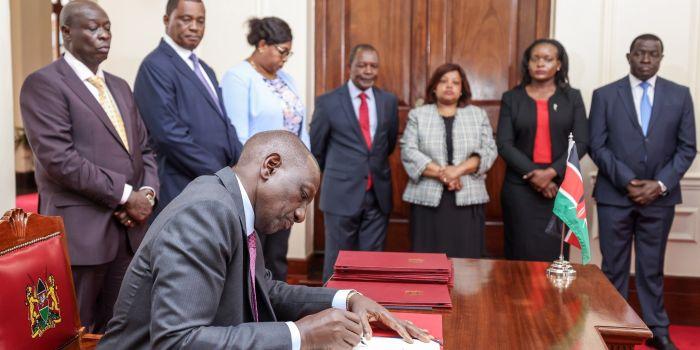Most Controversial Bills Approved by Parliament in 2023
Ever since President William Ruto assumed authority, he has approved numerous bills that have caused concern and scrutiny among the Kenyan populace.
One contributing factor to the momentum of Azimio’s Anti-government Protests earlier this year was the widespread sentiment among Kenyans, irrespective of their political affiliations, that the government had implemented harsh policies.
The Kenya Kwanza administration led by President William Ruto has been working hard to clarify the reasons for implementing these policies, despite many Kenyans feeling increasingly pressured and constrained.
These are the three essential and highly debated legislations endorsed by President Ruto.
The Finance Bill
In June 2023, President William Ruto approved the contentious Finance Bill at the State House after it was successfully passed by the National Assembly.
The legislation was approved following intense arguments between Kenya Kwanza members and opposition-affiliated politicians regarding certain suggestions outlined in the document.
The law was backed by 184 MPs largely linked with the Kenya Kwanza coalition, while it was opposed by 88 MPs mostly affiliated with Azimio.
The Bill had 87 proposed amendments that the National Assembly approved.
One of the controversial changes to the bill involved the Housing Levy, initially suggested to be 3 percent, but later adjusted down to 1.5 percent.
Other proposals in the bill included a tax for digital creators charged at 5 percent and the Betting and Insurance withholding tax, charged at 12.5 percent and 16 percent.
Privatisation Bill
President William Ruto, on October 9, assented to the Privatization Bill at the State House.
The bill repealed the Privatization Act 2005, which was enacted before the implementation of the current constitution.
The bill, which was sponsored by National Assembly Majority Leader Kimani Ichung’wah, contained a revised regulatory framework for privatizing public non-profit-making government entities.
The legislation aimed to increase involvement from private industries in economic output and enhance the provision of public services by engaging private funding and skills, aiming to generate extra income for the government.
Azimio la Umoja, led by leader Raila Odinga, took a swipe at the government protesting against the plan to privatize 11 parastatals, including Kenya Pipeline and the Kenyatta International Convention Centre (KICC).
Social Health Fund
In October, President William Ruto assented to the Universal Health Care Bill, a pivotal move geared at bolstering his Universal Health Coverage plan.
The legislative package comprised the Social Health Insurance Bill, Digital Health Bill, Primary Healthcare Bill, and Facility Improvement Financing Bill, all ratified by the National Assembly.
The Social Health Insurance Bill, a cornerstone of this reform, seeks to abolish the National Health Insurance Fund (NHIF), ushering in three new funds: the Primary Health Care Fund, Social Health Insurance Fund, and Chronic Illness and Emergency Fund.
Simultaneously, the Facility Improvement Financing Bill seeks to institute safeguards to ensure that funds generated in public health facilities are exclusively allocated to health-related purposes.
The legislation also seeks to solidify the role of Community Health Promoters in delivering community-based primary healthcare services.
The proposed law has faced opposition, particularly from healthcare practitioners and those employed in the formal sector.
The law proposes a mandatory monthly contribution of 2.75 percent to be drawn from Kenyans’ salaries, with a minimum cap set at 300 and a maximum at Ksh 5,000.
Most Controversial Bills Approved by Parliament in 2023
